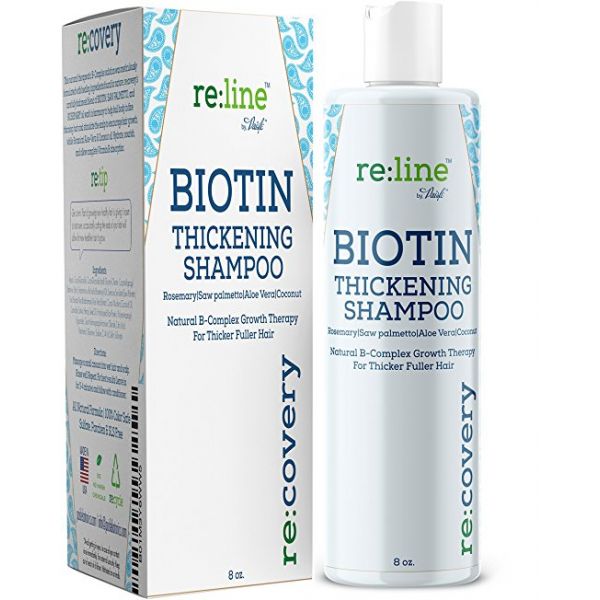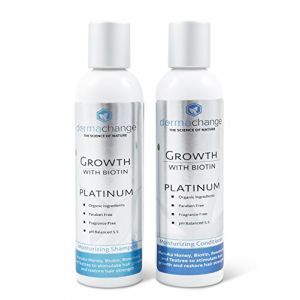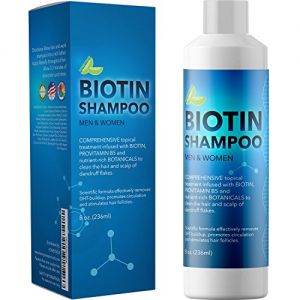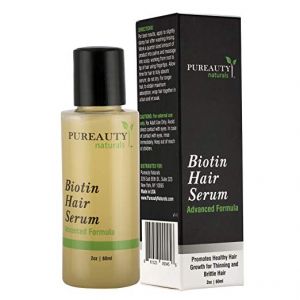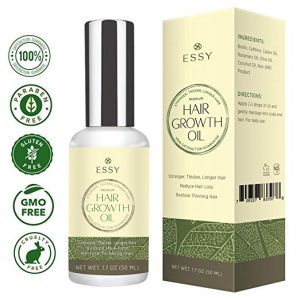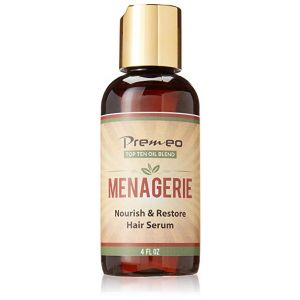- Pros:
- Powerful biotin-based shampoo for enhanced hair growth and volume
- Contains provitamin B5 and 11 nutrient-rich herbs, including natural dihydrotestosterone (DHT) blockers
- Targets dandruff
- Reinvigorates thin, fine hair
- Rejuvenates thinning hair
- Follicle revitalizing hair cleanser utilizes
- Strengthens and fortifies weak,fragile strands
- For all hair types, sensitive scalps, and color treated hair Anti-hair loss formula for men and women
- stimulates and strengthens hair follicles
- Promotes hair growth
- Supports thicker, fuller, softer, and healthier hair
- Scalp-soothing formula
- Long-lasting nourishing hair care
- Antioxidant-rich ingredients
- Boosts hair density
- Detoxifies the hair and scalp of DHT, dandruff
- and follicle-clogging dirt Protects collagen and elasticity to reduce breakage
- Silicone-free
- Paraben-free
- Cruelty-free
- Sulfate-free
Ingredients Concern: Fragrance;Cocamidopropyl Betaine
Cons: Fragrance has a score of 8 on EWG
Biotin, also known as vitamin B7, is an essential nutrient that is well known for its ability to support strong, vibrant skin (scalp) and hair [1-4]. Consuming biotin regularly helps prevent the occurrence of scalp irritation and hair loss [4, 5]. Rosemary oil and tea tree oil target a substance that is associated with hair loss known as dihydrotestosterone (DHT) [7, 8]. Jojoba oil helps loosen and promote the removal of sebum from the scalp, which is a thick substance that is linked to hair loss in some individuals [9].
Coconut promotes skin health, including the scalp, and enhances the body's ability to prevent and/or repair UV-induced skin and hair damage [10-13].
D-Panthenol (vitamin B5), Argan oil, and Primrose oil have moisturizing properties that are beneficial for the skin, including the scalp, and it promotes healthy hair follicles [14-17].
Promotes hair growth [1-5]; Lesses thinning hair [4, 5]; Targets scalp irritation [4, 5]
Biotin boosts metabolism and functions as a co-enzyme that enhances the breakdown of proteins, carbohydrates, fats (fatty acids) and other nutrients that nourish the hair [1-5]. Fatty acids in particular, strengthen the protective outer layer of the body's cells, including those that make up hair follicles [6]. Therefore, biotin promotes healthy hair growth by ensuring that vital nutrients are released from food and properly transported throughout the body (e.g. scalp and hair follicles).
A hormonal imbalance may cause certain enzymes such as 5-alpha-reductase may begin to convert testosterone in both men and women into a stronger substance called dihydrotestosterone (DHT). Increased DHT levels leads to the accumulation of a thick, dandruff-like substance called sebum. Sebum can clog the roots of the scalp, which can subsequently disrupt nutrient transport to the scalp and hair follicles, hair loss. Rosemary oil and tea tree oil block DHT activity, thereby preventing the buildup of sebum and hair loss [7, 8]. Jojoba oil mimics the texture of sebum and this reduces the production of sebum on the scalp [9].
Coconut oil supports moisture retention on dry, irritated skin (e.g., scalp) and it helps targets skin inflammation [10-13].
D-Panthenol (vitamin B5) promotes wound healing, targets acne, and helps the body combat acne-related skin issues, including those which affect the scalp [15]. D-Panthenol also helps nourish (mositurize) hair follicles, which supports hair growth and lessens hair loss [16].
In addition, Argan oil and evening primrose oil moisturize the hair and scalp, which helps restore volume, elasticity, and shine to thin looking hair [17].
Key Ingredients: D-Panthenol, Biotin, Argan ( Argania spinosa) Oil, Coconut (Cocos nucifera) Oil, Evening Primrose (Oenothera biennis) Oil, Olive (Olea europaea) Oil, Tea Tree (Melaleuca alternifolia) Oil, Rosemary (Rosmarinus officinalis) Oil, Zinc Pyrithione, Jojoba (Simmondia chinensis) Oil
All Ingredients: Water, Sodium Cocoyl Isethionate, Cocamidopropyl Betaine, Sodium Lauroamphoacetate, Sodium Methyl Cocoyl Taurate, Sodium Lauryl Glucoside Carboxylate, Lauryl Glucoside, Sodium Cocoyl Glutamate, Acrylates Copolymer, Coco-Glucoside, Glyceryl Oleate, Caprylhydroxamic Acid, Glyceryl Caprylate, Argan ( Argania spinosa) Oil, Coconut (Cocos nucifera) Oil, Evening Primrose (Oenothera biennis) Oil, Olive (Olea europaea) Oil, Tea Tree (Melaleuca alternifolia) Oil, Rosemary (Rosmarinus officinalis) Oil, Zinc Pyrithione, Glycerin, Sodium PCA, D-Panthenol, Biotin, Phytokeratin, Jojoba (Simmondia chinensis) Oil, Fragrance
Rinse hair and work shampoo into a rich lather. Apply liberally throughout hair. Allow 2-3 minutes of absorption, and rinse.
These statements have not been evaluated by the FDA. These products are not intended to diagnose, treat, cure or prevent any disease.
1. Zempleni J, Wijeratne SSK, Hassan YI. Biotin. Biofactors 2009;35:36-46.
2. Zempleni J, Mock DM. Biotin biochemistry and human requirements. J Nutr Biochem. 1999;10(3):128-138.
3. Zempleni J, Hassan YI, Wijeratne SS. Biotin and biotinidase deficiency. Expert Rev Endocrinol Metab. 2008;3(6):715-724.
4. Maarouf M, Platto JF, Shi VY. The role of nutrition in inflammatory pilosebaceous disorders: Implication of the skin-gut axis. Australas J Dermatol. 2019;60(2):e90-e98.
5. Trueb RM. Serum biotin levels in women complaining of hair loss. Int J Trichology 2016;8: 73-77.
6. Wakil SJ, Abu-Elheiga LA. Fatty acid metabolism: target for metabolic syndrome. J Lipid Res. 2009;50 Suppl:S138-43.
7. Panahi Y, et al. Rosemary oil vs minoxidil 2% for the treatment of androgenetic alopecia: A randomized comparative trial. Skinmed. 2015;13(1):15-21.
8. Henley DV, Lipson N, et al. Prepubertal gynecomastia linked to Lavender and tea tree oil. N Engl J Med. 2007;356:479-485.
9. Sandha GK, Swami VK. Jojoba oil as an organic, shelf stable standard oil-phase base for cosmetic industry.2009;2(2):300-306.
10. Agero AL, Verallo-Rowell VM. A randomized double-blind controlled trial comparing extra virgin coconut oil with mineral oil as a moisturizer for mild to moderate xerosis. Dermatitis 2004;15:109-16.
11. Evangelista MT, Abad-Casintahan F, Lopez-Villafuerte L. The effect of topical virgin coconut oil on SCORAD index, transepidermal water loss, and skin capacitance in mild to moderate pediatric atopic dermatitis: a randomized, double-blind, clinical trial. Int J Dermatol. 2014 Jan;53(1):100-8.
12. Rele AS, Mohile RB. Effect of mineral oil, sunflower oil, and coconut oil on prevention of hair damage. J Cosmet Sci. 2003;54(2):175-92.
13. Korać RR, Khambholja KM. Potential of herbs in skin protection from ultraviolet radiation. Pharmacogn Rev. 2011;5(10):164-73.
14. Heise R, Skazik C, Marquardt Y, et al. Dexpanthenol modulates gene expression in skin wound healing in vivo. Skin Pharmacol Physiol. 2012;25(5):241-248.
15. Vaxman F, Olender S, Lambert A, et al. Effect of pantothenic acid and ascorbic acid supplementation on human skin wound healing process. A double-blind, prospective and randomized trial. Eur Surg Res. 1995;27(3):158-166.
16. Goluch-Koniuszy ZS. Nutrition of women with hair loss problem during the period of menopause. Prz Menopauzalny. 2016;15(1):56-61.
17. Muggli R. Systemic evening primrose oil improves the biophysical skin parameters of healthy adults. Int J Cosmet Sci. 2005;27(4):243-9.

